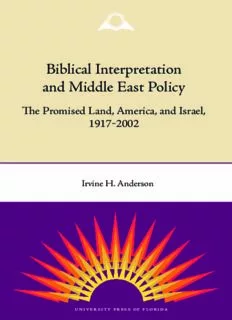
Biblical Interpretation and Middle East Policy: The Promised Land, America, and Israel, 1917-2002 PDF
Preview Biblical Interpretation and Middle East Policy: The Promised Land, America, and Israel, 1917-2002
Biblical Interpretation and Middle East Policy The Promised Land, America, and Israel, 1917‒2002 Irvine H. Anderson university press of florida Biblical Interpretation and Middle East Policy university press of florida Florida A&M University, Tallahassee Florida Atlantic University, Boca Raton Florida Gulf Coast University, Ft. Myers Florida International University, Miami Florida State University, Tallahassee New College of Florida, Sarasota University of Central Florida, Orlando University of Florida, Gainesville University of North Florida, Jacksonville University of South Florida , Tampa University of West Florida , Pensacola (cid:2) iblical Interpretation and (cid:3) iddle East Policy 1917‒2002 The Promised Land, America, and Israel, Irvine H. Anderson University Press of Florida Gainesville Tallahassee Tampa Boca Raton Pensacola Orlando Miami Jacksonville Ft. Myers Sarasota Copyright 2005 by Irvine H. Anderson Printed in the United States of America on recycled, acid-free paper All rights reserved Library of Congress Cataloging-in-Publication Data Anderson, Irvine H., 1928– Biblical interpretation and Middle East policy : the promised land, America, and Israel, 1917–2002 / Irvine H. Anderson. p. cm. Includes bibliographical references (p. ) and index. ISBN 978-0-8130-3596-3 (alk. paper) 1. Christianity and international affairs—History—20th century. 2. Middle East—Foreign relations—United States. 3. United States—Foreign relations—Middle East. 4. Christian Zionism—United States— History—20th century. I. Title. BR115.I7A53 2005 261.8'7'0973—dc22 2004-054151 The University Press of Florida is the scholarly publishing agency for the State University System of Florida, comprising Florida A&M University, Florida Atlantic University, Florida Gulf Coast University, Florida International University, Florida State University, New Colleg of Florida, University of Central Florida, University of Florida, University of North Florida, University of South Florida, and University of West Florida. University Press of Florida 15 Northwest 15th Street Gainesville, Fl 32611-2079 http://www.upf.com For my father and mother, (cid:4) Irvine and Elizabeth nderson Contents List of Tables viii Acknowledgments ix Prologue: A Synopsis of the Study 1 Part I. The Bible in Anglo-American Culture 5 1. Biblical Criticism and the Rise of Fundamentalism 7 2. The Promised Land and Armageddon Theology 32 Part II. British and American Policy 51 3. The Balfour Declaration and the Palestine Mandate 53 4. Truman, the Bible, Israel, Oil, and the Soviet Union 75 5. Christian Influence and Congressional Support of Israel 102 Epilogue: The al-Aqsa Intifada, September 11, and the Dynamics of Policy 130 Notes 139 Sources and Bibliography 165 Index 177 Tables 2.1. Membership in American Churches, 1998 38 5.1. Religious Affiliation of Members of the United States Congress in 1999 111 5.2. U.S. Assistance to Israel, FYs 1949–95 (millions of dollars) 120 Acknowledgments This is a case study of the influence of cultural tradition on international rela- tions, specifically of the influence of the Christian Bible on British and Ameri- can Middle Eastern policy in the twentieth century. In one sense it documents what has been obvious to many observers for a long time, but only in selected episodes. It draws on original research down a number of unexplored avenues and on the research of others in specific instances. I hope that it offers a coherent picture of how biblical influences have permeated British and American society and how those influences have created a cultural framework within which Zi- onist and pro-Israel lobbies could more easily function. This is an influence sometimes referred to as “Christian Zionism.” It is impossible to fully acknowledge the assistance of the scores of people who have made this study possible, some in small ways and some in large, but a few stand out. Dr. Henry R. Winkler, president emeritus of the University of Cincinnati, first suggested that I pursue a study such as this, and I was encour- aged to undertake it by Rev. Dr. Donald Wagner, executive director of Evan- gelicals for Middle East Understanding; Rev. Walter Owensby, of the Wash- ington Office of the Presbyterian Church (USA); and Professor Samuel P. Huntington of Harvard University. Many people provided invaluable insights and kept me from straying too far afield. Among them were Dr. Peter Obermark, then of Hebrew Union College in Cincinnati, who provided considerable help with recent biblical scholarship, and Rev. Dr. Philip B. Cliff, of Birmingham, England, who greatly enhanced my understanding of the English Sunday school movement. Rev. Dr. Stephen R. Sizer of Surrey, England, gave me a better understanding of the phenomenon known as Christian Zionism. Dr. Andrew Semmel, then legislative assistant to Senator Richard Lugar, helped me to better understand the workings of Con- gress. Professor Yaakov Ariel, of the University of North Carolina, read the
Description: